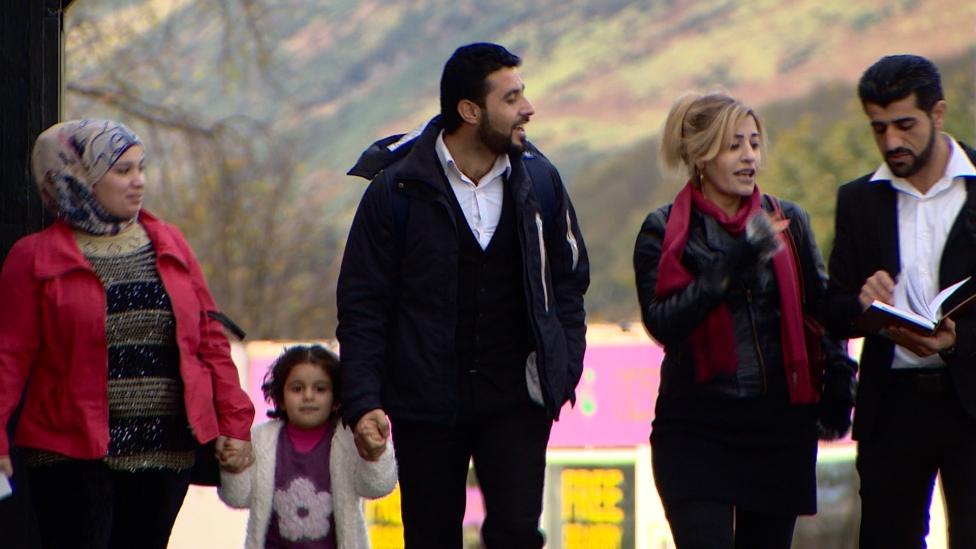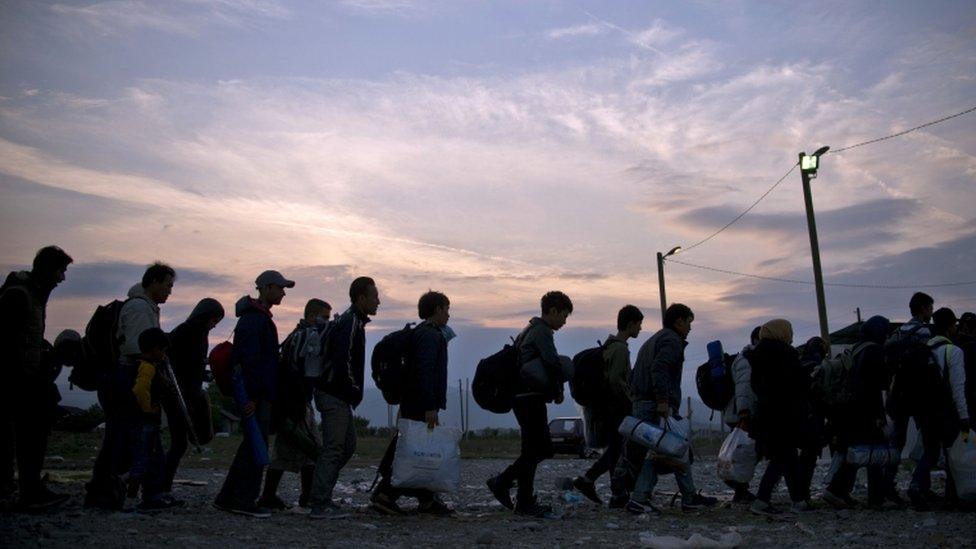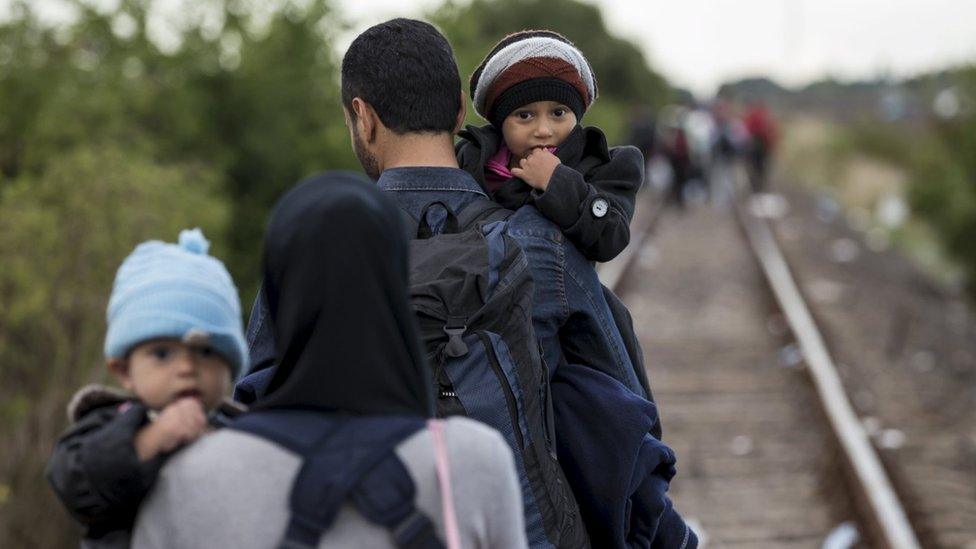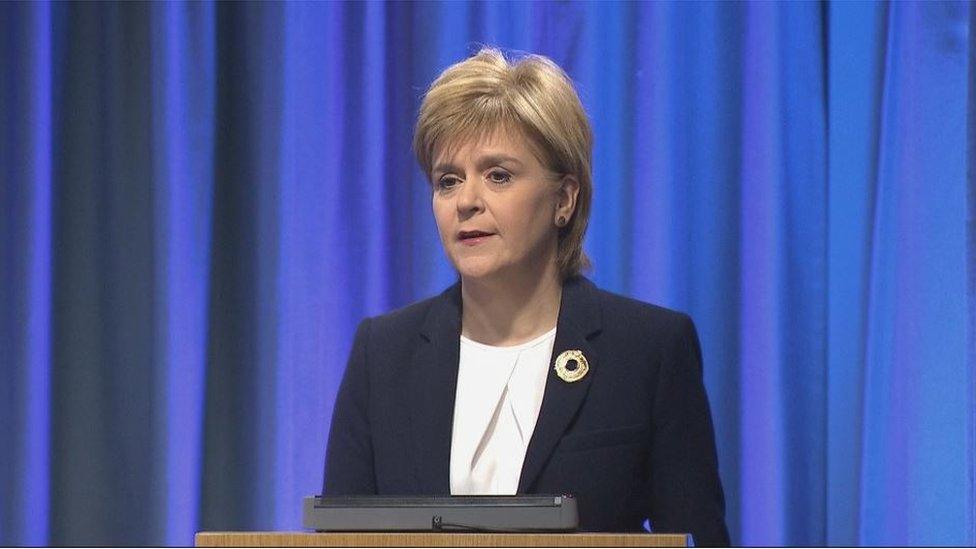Scotland welcomes 1,200 Syrian refugees in one year
- Published

More than 1,200 Syrian refugees have now settled in Scotland
Scotland has welcomed more than 1,200 Syrian refugees since the first flight arrived in Glasgow a year ago, according to the Scottish government.
A total of 29 local authorities have received people fleeing the war-town country since 15 November last year.
Equalities Secretary Angela Constance said the response from people around the country had been "phenomenal".
The Scottish Refugee Council said it was a "good start" but more could be done on a UK-wide basis.
'Warm welcome'
The UK as a whole is committed to resettling 20,000 Syrian refugees through its Vulnerable Persons Resettlement (VPR) scheme by 2020.
About 3,000 have already arrived in the UK, and more than a third of them have made homes in Scotland.
Ms Constance said: "People in Scotland were shocked by the humanitarian crisis in Syria.
"There was a groundswell of people looking to know how they could help and wanting to see our country take a stance and offer a warm welcome for those who sought refuge.
"The response has been phenomenal and we have seen the hand of friendship extended to those seeking to flee war."

Hundreds of thousands of refugees have arrived in Europe over the past year
Scotland has been praised for "leading the way" in efforts to resettle refugees by Westminster's Home Affairs select committee.
However Derek Mitchell, the chief officer of Cosla's migration, population and diversity team, warned that "in a way, it's the easy bit that has been done".
He said: "The refugees have all been accommodated; they have been given access to welfare benefits; the children are in school and the adults are in English language classes; some are making their first steps into employment and training opportunities.
"They have also been warmly welcomed into the communities that they now call home, and their neighbours, local churches and mosques and a host of other volunteers have gone above and beyond to help them to feel welcome."
The resettlement programme had been a "great success" but Cosla recognised that more still needed to be done to help the refugees, he said.
Shirking their responsibilities
"Those who have been resettled through the programme are amongst the most vulnerable victims of the conflict, many having suffered significant trauma and injury - both mental and physical - and these wounds will not heal quickly or easily," he added.
"They have also had to face the unimaginable heartache of leaving behind family members, to say nothing of almost all of their worldly possessions, and we should not underestimate the many challenges that they will face as they seek to build new lives for themselves in Scotland."
The new figures has led to renewed calls for the UK as a whole to do more to help those who have been displaced by the turmoil in Syria.
Earlier this month Amnesty International accused the world's wealthiest nations of shirking their responsibilities towards refugees.
Salil Shetty, its secretary general, said the UK was a "sad example" of countries' failure to take responsibility.
John Wilkes, the chief executive of the Scottish Refugee Council, told BBC Radio's Good Morning Scotland programme that the UK had made a good start - but more could be done.
'Fairly modest ambition'
"Sweden is taking 60,000 over a couple of years and Germany is obviously taking a lot more than that," he said.
"If we were taking our proportionate role within the EU, the figures that we would have been maybe taking would be maybe 100,000 over the five years.
"It may sound like a lot of people but in terms of overall migration and the capacity of the UK, I think there would be more than enough room in the UK to accommodate those people."
MP Stuart McDonald, the SNP's representative on the home affairs select committee, told the programme the UK-wide ambition was "fairly modest".
He said: "In Scotland, it is very positive that 29 out of 32 authorities have taken in refugees but much more can be done on a UK-wide basis."
"I genuinely think that, given the scale of the crisis, and the problems that you see across Europe and the region across Syria, we are not yet playing our part as the United Kingdom. It's not easy, it is challenging but I think we can contribute far more."
- Published1 September 2016

- Published6 September 2015

- Published4 September 2015
